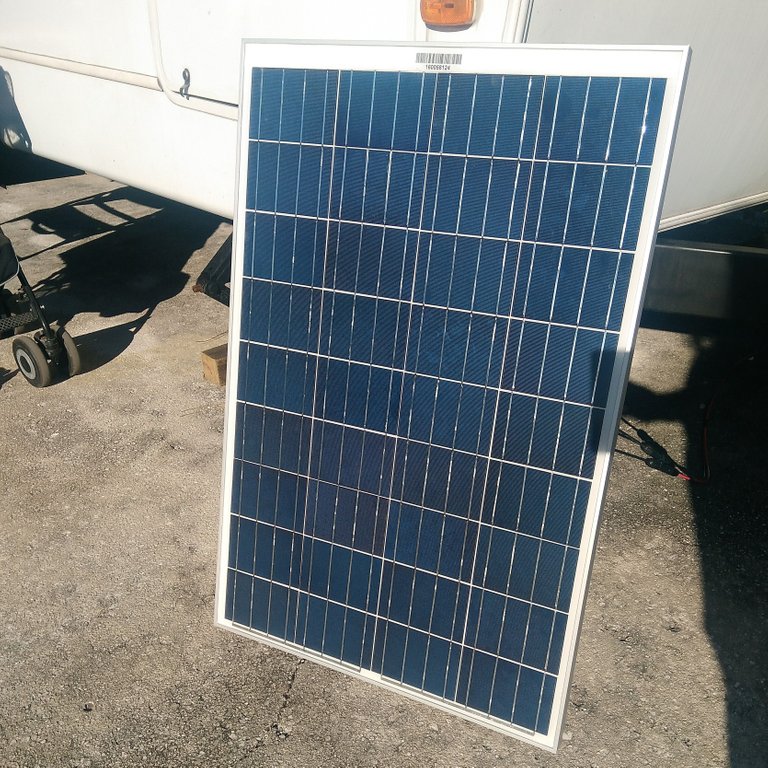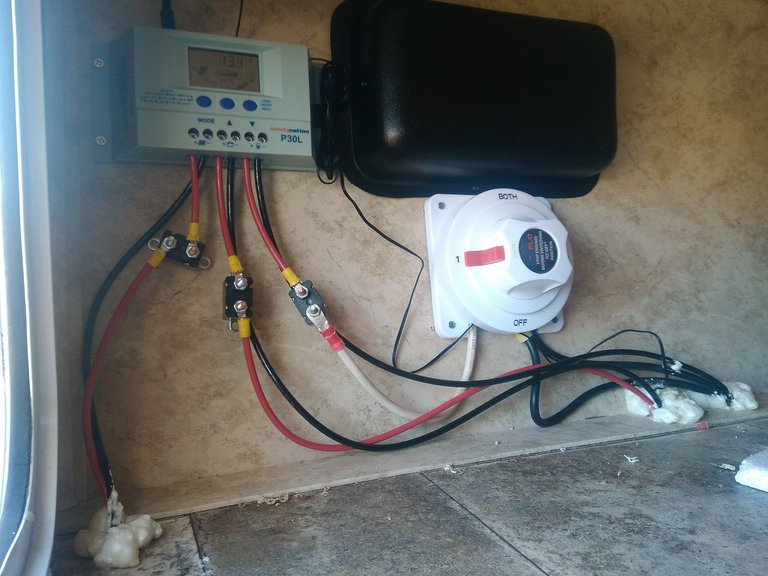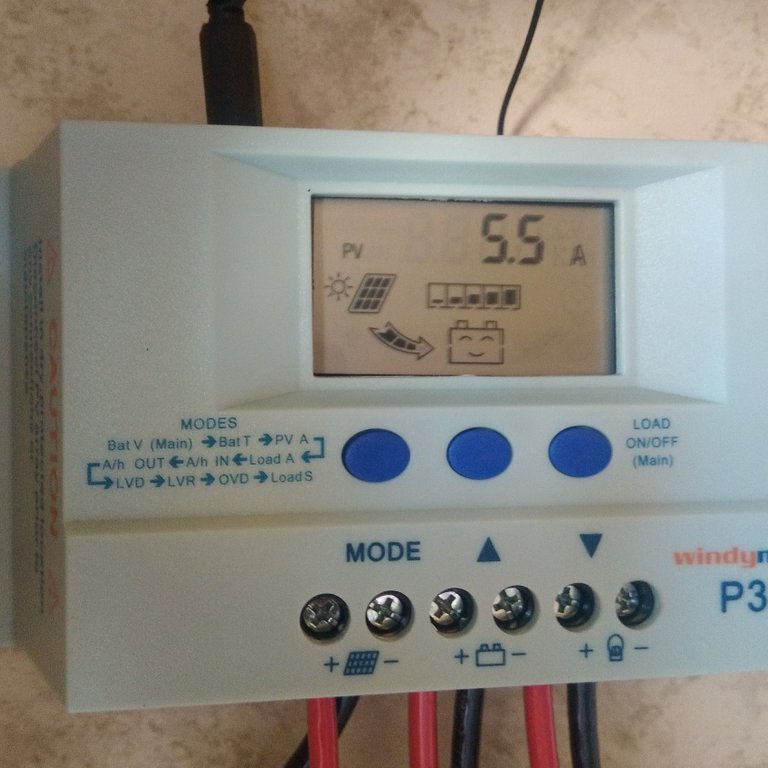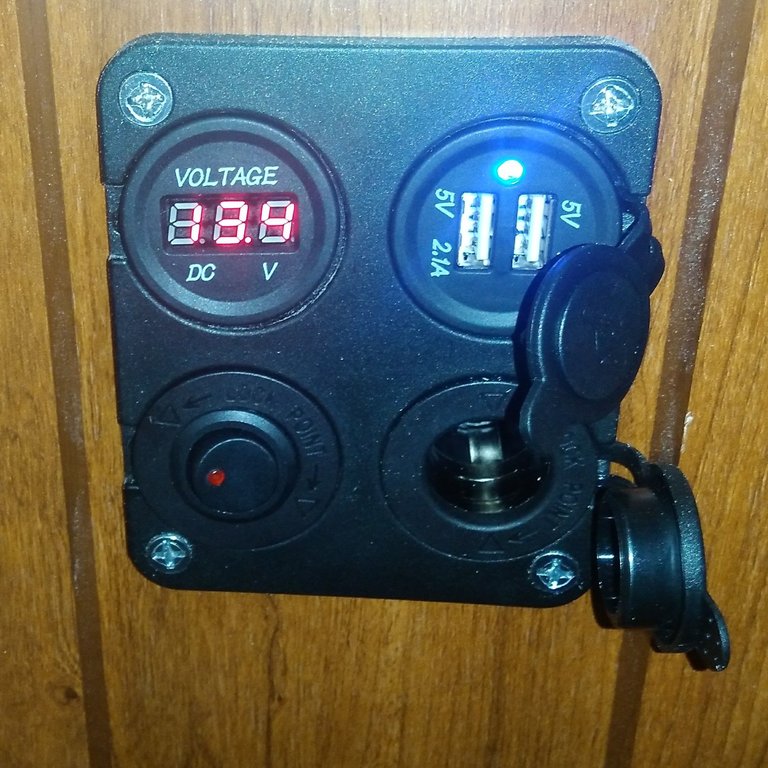One year ago today I wired our trailer to accept solar panels. Installing solar in an RV can greatly extend the ability to stay in places that do not offer any hookups. Being independent with regards to electricity would be great but would require a bigger investment than I could do at the time. My original plan had been to get two 100w panels and install them on the roof of our trailer. That would be a good start and then I could add more panels later. But as often happens when I weigh all options and consider the cost and benefit of something I decided to start with only one panel. I also made the decision not to install it on the roof but keep it loose and just deploy it when we didn't have any hookups.

100w panel deployed and making electricity for us.
I find that this one panel will give us about 30 amp hours of energy on a decent day. This is about how much we use if we are careful. It is plenty to replenish the power used by lights and the water pump. It is also enough to charge a couple of cell phones. We do have a small inverter to give us 110volts if we need it but there is not much that we really need to power with 110v. I can only think of two things that we have powered with the small inverter that we have. One is to charge our laptops as we have not gotten a 12v charger for them yet. It would save energy if we did since there is a double loss when using an inverter to bring the 12 volts DC from the batteries up to 110 volts AC and then the laptop charger to bring it back down to ~19 volts DC. It is much more efficient to just bring the 12v DC up to the voltage the laptop needs without changing it to AC and going all the way up to 110 volts first. The only other thing I've used the inverter for is charging the batteries for my power tools. We don't use our TV that much and even if we could run it on the inverter we never have so far.
The heart of the install is just behind the batteries inside the front storage compartment.

Charge controller and master switch.
This picture shows how I mounted the controller and added a master switch that allows me to disconnect the batteries completely or bypass the solar charger. The cables on the left go through the floor and terminate in a standard 3-prong electrical plug that I use to connect the panel with. Each positive line also has an inline auto reset fuse. The black box was already there and houses the circuit board and relays for the slide-out.

In full sun we get as much as 5.5 amps of charging power.
At the same time as I installed this, I also added a 12v charging center inside the camper. This includes a volt-meter to monitor the batteries, a standard 12v power socket and a dual 5v USB charging ports. The 12v power socket is fused for 25 amps and allows us to use a 300w inverter without any issues.

A great addition that we use almost every day to charge cell phones.
My hope is to install two 100+ watt panels on the roof after the summer, and also upgrade to a better charge controller. This should be enough to allow us to stay without hookups for several weeks at a time. We would run out of fresh water and fill up our gray and black water tanks before power becomes an issue.
Thanks for following the journey of me and my family
as we travel and roadschool our kids around the USA.
If you like this post please consider upvoting, following and resteeming!

Thx for article. One day I want to get an RV and have solar power.
I hope that day will come soon for you! It gives an incredible freedom to have a home on wheels and adding solar to that increases the freedom even more.
steady once his post. I want to say how much it costs to install solar power.
It does require an initial investment but it does not have to be super expensive. I try to take into account that with an RV equipped with solar you don't have to pay for campgrounds every night. If you look at it that way a 100w solar panel will be paid for in just a few nights. The same is true for a good battery. A week of boondocking will save enough money to get what you need for a small 100w system with a panel, controller and cables.
If you want to power your house with solar that is a different story. It still might be worth it depending on how much you can save on your energy bill and how long it will take to "earn back" the initial investment.
can not love how to make the installation and the name of the goods in use let me try to use solar energy because in my area the goods are still difficult in the search
There should be more solar panels in Thailand as there seems to be solar rays every day. However, it's commercial use is very limited, at least, that's from observation. It will definitely reduce the electricity bill in the long-run for the ordinary Thais. Maybe it's the initial start-up cost that disinterest them. You said in another comment that it doesn't need to be expensive, so maybe it's not as widely promoted over here.
The price of solar panels is coming down rapidly, at least in the US and Europe. It would still be a lot of money in countries like Thailand where the average monthly salary is just over $400 (with most people making much less).
You know your figures! Yes, it's quite shameful that the average monthly salaries are low as Thailand strives to be a leading force in ASEAN (Singapore leads the way - stark contrast in average monthly salaries with them). Still we are sure there are projects from corporations to install solar panels in low-economic regions to help the locals.
It feels so good seeing that more and more people are investing in green alternatives for our energy consumption!
Yes! And it is a very good feeling being one of the people doing that. It would be great to be energy independent, but that would require a much bigger system than what I have right now.
This is really great, I wish to install solar power in my home too.
It's a great feeling knowing that the electricity you are using is something that you produced yourself.
Resteeming! This is GREAT information for us off-gridders and homesteaders
Thanks @fanstaf
Thanks! That's exciting for me to hear. I don't get very many resteems.